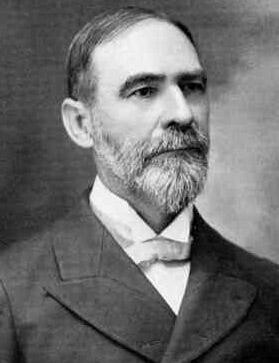Benjamin Franklin (B.F.) Allen had Terrace Hill constructed between 1866 and 1869.
His story and connection to Des Moines began much earlier. B.F. Allen was born in Indiana in 1829. Orphaned at the age of four, Allen seemingly inherited a life of poverty. Despite Allen’s lack of formal education, he would eventually go on to become Iowa’s first millionaire. Sources estimate his fortune to be between 4 and 12 million dollars at its height.
Allen lived with his grandfather in Ohio until his teenage years. At 17, he enlisted in military service.
Following Allen’s military service, he arrived in Des Moines in 1848 at the age of 19, to collect an inheritance from his uncle, Captain James Allen. Captain Allen was responsible for establishing Fort Des Moines in 1843, an Army outpost at the meeting of the Des Moines and Raccoon Rivers.
Allen’s Arrival in Fort Des Moines
Allen became instrumental in the development of Des Moines. He quickly established himself as a merchant and began widening his business interests. He started a steam sawmill near town and also opened a general store at the corner of Second and Vine Streets.
Allen’s Venture into Banking and Real Estate

In 1855, Allen began his career as a banker and real estate operator, acquiring 34 acres of land that included the future site of Terrace Hill.
Sources estimate that at one time, Allen’s total land holdings in Iowa were at least 93 square miles or more.
In 1857, the same year Fort Des Moines changed its name to the City of Des Moines, Allen became one of the directors of the State Bank of Iowa.
Allen soon acquired a controlling interest in the Bank of Nebraska, which he managed from his private banking house in Des Moines
During the Panic of 1857, Allen kept many local businesses afloat by endorsing promissory notes guaranteeing he would pay their debts. This garnered Allen an immense amount of goodwill, and he became a local hero.
By 1860, Allen had been instrumental in transforming Des Moines from a rustic settlement of 200 people into a town of nearly 4,000.
Iowa Senator Benjamin Franklin Allen
In the 1860s, Allen began his involvement in local politics.
Elected to the Des Moines City Council in 1860, Allen became a well-known figure in the Iowa Republican Party.
Allen would eventually go on to serve as a senator in the Iowa state legislature, representing Polk County during the thirteenth and fourteenth general assemblies (1870-71).
Senator Allen was influential in securing the legislation providing for the new Capitol building, which was constructed between 1871 and 1886.
The Rock Island Railroad
In 1865, Allen organized the Rock Island Railroad.
By 1867, the railroad reached Des Moines, and Allen was appointed in court to hold in trust more than $500,000 in railroad bonds of the Chicago Rock Island and Pacific Railroad while debates over land rights could be settled.
He bought up property along the proposed route west to the Missouri River, established a land company, plotted town sites and stations along the route, and sold them at a sizable profit.
However, he used the railroad trust funds to speculate, a decision that would ultimately contribute to his financial ruin.
Terrace Hill & The Allen Family
In 1854, Allen married Arathusa West. Between 1866 and 1869, the Allens built Iowa’s most-prized home, Terrace Hill.
In 1866, when construction began, Allen’s fortune was at its height. The 29-acre site began at approximately 17th Street on the east running west to 29th Street. The Raccoon River was the southern border and present-day Grand Avenue was the northern border.
Allen selected Chicago architect William W. Boyington to design Terrace Hill. The house contained very modern features for its time including:
- Hot and cold running water
- Gas lights
- An elevator
- Indoor restrooms
Situated on the highest hill in Des Moines, the original 30-acre estate boasted pathways, fountains, an arbor, and a greenhouse as well as formal and cutting gardens.
The final cost of the building and grounds was approximately $250,000.
By the time the Allens moved into Terrace Hill during the summer of 1868, they had three children: Kathryn (Kitty), age 12; Frank Jr., age 5; and Bessie, age 2. Their last child, Harry, was born at Terrace Hill the next year.
On January 29, 1869, the Allens hosted a lavish housewarming, with 700 guests in attendance, to celebrate their 15th wedding anniversary.
Allen supposedly spent $8,000 on food, flowers, and entertainment - which would be equivalent to more than $180,000 today.
The food, prepared by a Chicago chef, was served at 10:00 p.m. in the dining room. The meal included, “Two fruitcakes weighing twenty-five pounds each, ice cream molded in the figure of George Washington, a twenty-five-pound lady cake, oysters, boned turkeys in colored jellies, and a variety of meats.”
Two pianists and singers provided musical entertainment.
Allen’s Financial Downfall
In May 1873, Allen made a move that hastened his spectacular downfall.
By this time his debt was significant, having borrowed the railroad trust funds for his own investments.
In desperation to pay off his debts to the courts, he purchased controlling interest in the Cook County National Bank in Chicago and was elected president.
Despite Allen’s efforts to guarantee the bank by relying on his personal assets, the bank crashed in January 1875, taking Allen with it.
Litigation involving the liquidation of Allen’s estate dragged on until the mid-1880s.
There were two criminal trials for fraud over a period of eight years (one case went to the United States Supreme Court). Allen escaped conviction as the juries believed he vainly poured his own assets into the bank to save it.
Many local residents believed the same, despite their losses for which he was responsible. Allen managed to retain possession of Terrace Hill and eight acres of immediate grounds until 1884, when Frederick M. Hubbell purchased the property for $60,000.